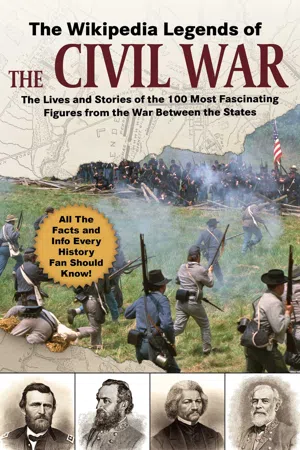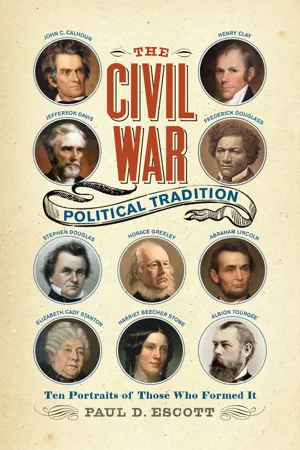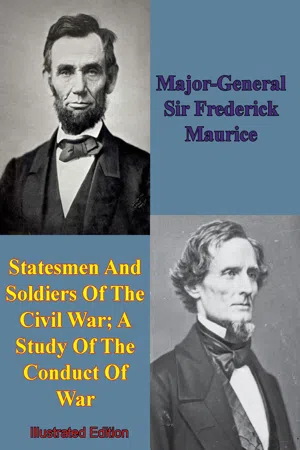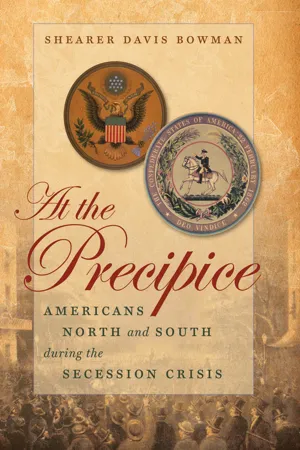History
Jefferson Davis
Jefferson Davis was an American politician who served as the President of the Confederate States during the American Civil War. Prior to this, he had a distinguished military and political career, including serving as a U.S. Senator and Secretary of War. Davis was a prominent figure in the secession of Southern states and the subsequent formation of the Confederacy.
Written by Perlego with AI-assistance
Related key terms
1 of 5
10 Key excerpts on "Jefferson Davis"
- eBook - ePub
- Vivienne Sanders(Author)
- 2021(Publication Date)
- University of Wales Press(Publisher)
Davis had spoken out against secession in 1858. While he believed that each state had a sovereign right to secede, he feared the North would not let the South go, and recognised that the South lacked the military and naval resources to defeat the North. By 1861, however, he felt the South had little choice, and when Mississippi seceded, Davis resigned from the US Senate. In his final Senate speech, on what he described as ‘the saddest day of my life’, he reminded his colleagues of the nation’s history. He said that the United States was born on the principle of the right to withdraw from a government that threatened people’s rights. He argued that each state had entered the Union voluntarily and therefore had the right to leave it when it chose. ‘We but tread in the path of our Fathers when we proclaim our independence.’Here lay two competing visions: Southerners such as Jefferson Davis wanted to continue making America in the image of the Founding Fathers, many of whom were slave-owners and all of whom had conceded the continuation of slavery; Northerners such as the Republican Abraham Lincoln wanted a remaking of America in which slavery would at the very least be excluded from any new territories.President DavisHistory is usually written by the victors, so it is not surprising that Jefferson Davis has been much criticised. He led a nation that was not only defeated but also supported the evil of slavery.Davis claimed that he did not want to be President of the Confederate States of America: ‘I have no confidence in my capacity to meet its requirements. I think I could perform the functions of general.’ His wife Varina recalled how in spring 1861 he told her that he had been chosen as president ‘as a man might speak of a sentence of death’. When a Mississippi official asked Davis what the future held, the new president answered that ‘there would be war, long and bloody’. It concerned him greatly that the seven Southern states that had seceded from the Union contained only 10 per cent of the US population and 5 per cent of its industrial capacity. In the hope of avoiding war, Davis offered to pay the South’s share of the national debt and to purchase federal property in the South, but while in 1776 Lincoln’s ancestors had thought it their right to declare their independence from a government they disliked, Lincoln considered the Confederacy illegitimate and refused to negotiate in 1861. - eBook - ePub
The Wikipedia Legends of the Civil War
The Incredible Stories of the 75 Most Fascinating Figures from the War Between the States
- (Author)
- 2020(Publication Date)
- Skyhorse(Publisher)
Jefferson Davis Jefferson Finis Davis [a] (June 3, 1808–December 6, 1889) was an American politician who served as the president of the Confederate States from 1861 to 1865. As a member of the Democratic Party, he represented Mississippi in the United States Senate and the House of Representatives before the American Civil War. He previously served as the United States Secretary of War from 1853 to 1857 under President Franklin Pierce. Davis was born in Fairview, Kentucky, to a moderately prosperous farmer, the youngest of ten children. He grew up in Wilkinson County, Mississippi, and also lived in Louisiana. His eldest brother Joseph Emory Davis secured the younger Davis’s appointment to the United States Military Academy. After graduating, Jefferson Davis served six years as a lieutenant in the United States Army. He fought in the Mexican–American War (1846–1848), as the colonel of a volunteer regiment. Before the American Civil War, he operated a large cotton plantation in Mississippi, which his brother Joseph gave him, and owned as many as 113 slaves. [1] Although Davis argued against secession in 1858, [2] he believed that states had an unquestionable right to leave the Union. Davis married Sarah Knox Taylor, daughter of general and future President Zachary Taylor, in 1835, when he was 27 years old. They were both stricken with malaria soon thereafter, and Sarah died after three months of marriage. Davis recovered slowly and suffered from recurring bouts of the disease throughout his life. [3] At the age of 36, Davis married again, to 18-year-old Varina Howell, a native of Natchez, Mississippi, who had been educated in Philadelphia and had some family ties in the North. They had six children - eBook - ePub
The Civil War Political Tradition
Ten Portraits of Those Who Formed It
- Paul D. Escott(Author)
- 2023(Publication Date)
- University of Virginia Press(Publisher)
Jefferson DavisA Defiant Tradition and Tradition Defied
T he South’s planter-politician is a stereotype in the collective memory of the antebellum and Civil War eras. For many people that stereotype derives mainly from the history of Virginia, South Carolina, or the Eastern Seaboard states. It connotes rigid states’ rights advocates from old families and established wealth, aristocrats with a classical education, patriarchal values, and a genteel country lifestyle based on enslaved labor. The First Families of Virginia—a few dozen families that had inordinate influence during colonial days—helped to establish the stereotype, which fit presidents Jefferson, Madison, and Monroe. Later, defenders of the Confederacy adopted it by deifying J. E. B. Stuart as a gallant cavalier and Robert E. Lee as a model aristocratic gentleman. Literary apologists for the South and for Virginia especially, such as John Esten Cooke, George William Bagby, and Thomas Nelson Page, did much to burnish those images and lodge them in the public mind.How does Jefferson Davis of Mississippi fit into this picture? As the would-be nation’s chosen president, we would expect him to enhance the myth. He was wealthy, and he was an ideologue who argued for states’ rights and southern interests throughout the sectional crisis. (Like other ambitious southerners, he strove to emulate Calhoun in bold defiance and renown.) But other similarities to the myth are few. In fact, much about Jefferson Davis does not conform to the popular and mythologized version. Many aspects of his life contradict the popular stereotype and provoke a collision of myth with reality. Davis’s personal history and his record as Confederate president reveal important facts about the South and the Confederacy—facts that champions of the Lost Cause and Confederate memory prefer to ignore. - eBook - ePub
REBEL YELL: History of the Confederacy, Memoirs and Biographies of the Confederate Leaders & Official Documents
Biographies and Battles of Confederate Icons
- Jefferson Davis, Heros von Borcke, Robert E. Lee, Frank H. Alfriend, John Esten Cooke(Authors)
- 2017(Publication Date)
- Madison & Adams Press(Publisher)
From Europe, in the beginning, so prejudiced against the South and its cause, so misinformed of Southern motives, and unacquainted with Southern history, came the tribute of disinterested eulogy, the more to be valued, because reluctantly accorded, to the Confederacy and its ruler. To Europe the South was now known not only through a series of unparalleled victories; as a people who had successfully asserted their independence for nearly two years, against such odds as had never been seen before; as a land of valiant soldiers, of great generals, and of large material resources. If possible, above these, the statesmen and politicians of Europe admired the administrative capacity, which, they declared, had given a superior model and a new dignity to the science of statesmanship. To the educated circles of Europe the new power was introduced by State papers, which were declared to be models, not less of skilled political narration and exposition, than of literary purity and excellence. Accustomed to hear the South twitted as a people dwarfed and debased by the demoralization of African slavery, the educated classes of England acknowledged the surprise and delight they experienced from the powerful and splendid vindications of the cause of the Confederacy, in the messages of Mr. Davis. It has been truthfully remarked that there could be no better history of the war than that contained in his numerous state papers. They are the exhaustive summary, and unanswerable statement of the imperishable truths which justify the South, and overwhelm her enemies with the proof of their own acts of wrong and violence.Under the new light given to mankind, as to the origin, nature, and purposes of the American Union, which Mr. Davis so lucidly explained, Europe soon recognized his position as something else than that of a ruler of an insurgent district. But not only as the chosen Executive of eleven separate communities, several of which European governments had previously recognized as sovereign; as one who had organized great armies, maintained them in the field, and selected leaders for their command already illustrious in the annals of war; not for these and other features of enduring fame, alone, was Jefferson Davis admired in Europe. The contrast between the civil administrations of the hostile sections was viewed as, perhaps, the chiefly remarkable phase of the struggle.President Lincoln, beginning the war with usurpation, had committed, in its progress, every possible trespass upon the Federal Constitution, and was now under the influence of a faction whose every aim contemplated the overthrow of that instrument. President Davis, supported by a confiding people, and an overwhelming majority of every Southern community, ruled in strict conformity with the laws of the land and its Constitution. In the midst of a revolution, unexampled in magnitude, in fierceness, and vindictiveness on the part of the enemy, and of difficulties in his own administration, he furnished an example of courage, humanity, and magnanimity, together with the observance of order, civil freedom, and legal and constitutional restraints unexampled in history. In the Confederacy, the Roman maxim, Inter arma silent leges - Emory M. Thomas(Author)
- 2021(Publication Date)
- University of South Carolina Press(Publisher)
In so doing the government, or more usually Jefferson Davis as leader and symbol of the civilian Confederacy, incurred the displeasure of those who felt the government had gone too far and of those who thought it had not gone far enough. Within the limits of its ability the Davis administration dragged Southerners kicking and screaming into the nineteenth century. A scholar has recently concluded with regard to this subject: Despite their firmly held states' rights beliefs, Southerners were compelled by wartime exigencies to increase the powers of the cen-tral government far beyond what was intended originally. And in this on-going process of change a governmental system evolved that revealed a striking resemblance to the one from which the South had withdrawn.2 These are strong assertions. But after examining the salient actions of the Confederate government, we may find that the wartime South became more centralized, more nationalized than her Northern enemy. In any event the Confederate experi-ence revolutionized Southerners' antebellum notions of state rights. The temptation of both critics and friends of Jefferson Davis has been to blame or applaud the Confederate president alone for nearly everything the Confederacy did or failed to do. It is true that Davis as wartime president of a new nation had un-precedented political power. It is also true that Davis exercised his power and influence fully, often arbitrarily. But no one could accuse Davis of being a great politician. Nor could any-one picture other Southern politicians, with their strong herit-age of individualism and their habit of asserting their will in national councils, meekly acquiescing to the dictates of any democratic leader, great politician or no. It would seem that 2. Curtis A. Amlund, Federalism in the Southern Confederacy (Washington, D.C.: Public Affairs Press, 1966), p. v.- Major-General Sir Frederick Maurice(Author)
- 2015(Publication Date)
- Golden Springs Publishing(Publisher)
{6} There have been many less competent statesmen in time of war than Jefferson Davis. It happened that he was opposed to a giant, and the inevitable comparison has made him appear to be a dwarf, which he was not. In another milieu he would have appeared to be an administrator of more than average competence; where he failed was in the general direction of military operations, in combining policy and strategy, and he failed there because he had never worked out in his mind a system for the conduct of war.When Jefferson Davis was chosen to be President of the Southern Confederacy he possessed an unusual equipment for a statesman confronted with problems of war. The son of a small farmer of the South, he obtained through the influence of an elder brother a nomination to West Point, and passed through the Military Academy at a time when two men with whom he was to be closely associated, Robert E. Lee and J. E. Johnston, were there. He entered the United States cavalry in 1828 and was engaged as a. young officer in that Black Hawk War, in which his great opponent Abraham Lincoln served as a volunteer captain. But he tired of military service and, his elder brother having made a fortune as a cotton planter in Mississippi, he left the army to become, like his brother, a successful grower of cotton and employer of slaves. Turning his mind to politics, he was elected to Congress in 1845, and was a member of the Federal Legislature when the Mexican War broke out. He then raised and commanded a regiment of Mississippi Rifles, which he took to the front, and at the battle of Buena Vista he gained with his regiment a somewhat facile success over the Mexicans, which made him one of the heroes of the war. The effect of this upon his political career was immediate, and may be compared with the consequences of Roosevelt’s not dissimilar exploits in Cuba. He was made a Senator at once, became one of the protagonists of the Southern cause and eventually the Southern leader in the Senate. When Pierce was elected President in 1853 he chose Davis as his Secretary of War, and for four years the future leader of the Confederacy controlled the War Department of the United States, returning in 1857 to the Senate to resume his advocacy of the Southern cause.- eBook - PDF
Writing the Civil War
The Quest to Understand
- James M. McPherson, William J. Cooper, James M. McPherson, William J. Cooper, Jr.(Authors)
- 2021(Publication Date)
- University of South Carolina Press(Publisher)
17 The Vandiver-Thomas revolution in Confederate history raised the reputation of Jefferson Davis, though that was hardly its intent or start-ing-point. The viewpoint has influenced the biographies of Davis that have appeared since 1960. Clement Eaton's Jefferson Davis (1977), a book unequal to its distinguished author's reputation, put forward no clear mes-sage. Though Eaton seems never to have made up his mind about Davis, he did credit him with growth in the presidency, especially in freeing himself from the incubus of his original state rights obsession and arising as a true statesman to a conception of the growth of an organic nation and the development of realistic policies to attain Southern nationalism. 18 William C. Davis's Jefferson Davis: The Man and His Hour (1991), longer and more diffuse than Eaton's work, likewise retained the modernizing view: More than anyone else, Jefferson Davis built the system and organi-zation that kept those armies in the field another four years. Cajol-ing the governors, dominating Congress, having the courage to call for and enforce conscription, taxation, and the impressment of agri-cultural produce did not make him popular, but it kept the legions manned, armed, fed, and moving. Moreover it was Davis who, more than anyone else, accounted for what little sense of Confederate nationalism grew in the South. It came at the price of some of his 100 ABRAHAM LINCOLN VS. Jefferson Davis cherished states' rights beliefs, and cost him the goodwill of men like Stephens, Brown, Toombs, Vance, and more. 19 System and organization were not words that came readily to mind in writing about Jefferson Davis in the nineteenth century, but after Vandiver and Thomas wrote, they commonly appeared in works about his presi-dency.20 The Vandiver-Thomas modernist school was soon challenged, how-ever, by the appearance of the best book on Jefferson Davis written since 1960 and perhaps the best ever written about him: Paul D. - eBook - ePub
At the Precipice
Americans North and South during the Secession Crisis
- Shearer Davis Bowman(Author)
- 2010(Publication Date)
- The University of North Carolina Press(Publisher)
5 Jefferson Davis, Horace L.Kent, and the Old South
Jenator Jefferson Davis of Mississippi, like most political leaders in the Lower or Cotton South, began the secession winter of 1860-61 as a hesitant disunionist but came to endorse the decision to quit the Union as regrettable but necessary. He hoped that the U.S.government would let the seceding states depart in peace and avoid an internecine war. In this stance, Davis seems clearly to have spoken and written what the great majority of disunionist southerners thought and hoped on the eve of the Civil War. For this reason and for the obvious reason that he became the Confederacy’s first (and only) president, Davis’s life story before the secession crisis provides a valuable window on the historical evolution of the Old South, setting the stage for a more wide-ranging analysis of his region’s economy and society. This analysis addresses some substantial differences between the Upper and Lower Souths and discusses some individual citizens–in particular, a Virginia slaveholding merchant, Horace L. Kent, and his employee, Robert Granniss–to help illuminate those differences.Jefferson Davis’s father was Georgia native Samuel Emory Davis, probably born in 1756 and soon orphaned. After fighting against the British as a teenager during the American Revolution, Samuel Davis became proprietor of a two-hundred-acre land grant in Wilkes County and married Jane Cook of South Carolina in 1783. By the mid-1780s, his estate had grown to more than four thousand acres, though most remained uncleared, and by 1787 he owned his first slave, Winnie. In 1793, he and some of his wife’s relations responded to the lure of the fabled and fertile lands in trans-Appalachian Kentucky, just separated from Virginia as an independent state. After several years there, Samuel settled his family in the southwestern part of the state in what later became Todd County. He owned a second slave by 1801. Seven years later, forty-eight-year-old Jane gave birth to her tenth child in twenty-three years. Given the first name Jefferson in honor of the Virginian then serving as president, the boy received as his middle name Finis, Latin for “the end”: Jane clearly intended that he would be her last child. - eBook - PDF
- Randall M. Miller(Author)
- 2008(Publication Date)
- Greenwood(Publisher)
Davis embraced the theory of centralized control, and thereby sacrificed some of the jealously guarded individual sovereignty of seceded states. The Davis administration was the only national government the Confederacy would ever have, and it mirrored that of the federal government in most of its aspects with the exception of the term of its president, which was set at six years, rather than four. Davis, therefore, did not have to deal with a reelection campaign in the mist of a changing series of wartime successes and failures as did Lincoln. Nonetheless, the Confederate cabinet was in constant turmoil even during the earliest and most successful years of the war for the South. The details surrounding the Davis administration have attracted a good deal of second thinking concerning his abilities as a political leader and the government’s The Civil War | Political Life The Civil War, Reconstruction, and Industrialization of America, 1861–1900 152 ideological roots. The Confederate government lasted somewhat less than the six years its constitution had envisioned for the presidency making scholarly arguments concerning the lack of a two-party system, a single-term presidency, and the effects of state’s rights on a centralized system of governance somewhat superfluous. —James M. Volo Third Parties In the decade before the Civil War, third parties became an important part of national politics for the first time. Federalists and anti-Federalists (aka Jeffersonian Republicans, Democratic-Republicans) had faced off during the early years of the Republic, and the Whigs had emerged in the 1830s as the leading second party op- posing the Democrats, when the Federalists had collapsed after the War of 1812. It seemed for the first seven decades that two and only two parties could compete for national recognition at a time. Many of the older issues that had driven the two- party system had been resolved by 1848. - eBook - PDF
The American Civil War
A Handbook of Literature and Research
- Steven E. Woodworth(Author)
- 1996(Publication Date)
- Greenwood(Publisher)
The biography is not definitive because it suffers from the same problem, albeit to a lesser extent, as Eaton's in that Davis's significant postwar years are not examined in depth. Aside from his biographers, historians have rarely treated Davis's antebellum years. The exceptions are Walter L. Fleming's dated work on Davis's years at the United States Military Academy, Jefferson Davis at West Point (1910). Stud- ies of Davis and the Mexican War include Joseph E. Chance, Jefferson Davis's Mexican War Regiment (1991), and Lynda J. Lasswell's "The First Regiment of Mississippi Infantry in the Mexican War and Letters of Jefferson Davis Con- 206 Leaders cerning the War" (1969). Davis's senatorial years are analyzed by Lynda Lass- well Crist in "A 'Duty Man': Jefferson Davis as Senator" (1989). On Davis's term as secretary of war, see David Sansing, "A Happy Interlude: Jefferson Davis and the War Department" (1989). For the history of Davis's pre-Civil War home see Frank Edgar Everett, Jr., Brierfield, Plantation Home of Jefferson Davis (1971). Davis's Civil War years have been examined much more thoroughly. The debate on Davis's success, or lack thereof, in putting together a Confederate nation persists. Those who find Davis effective and innovative include Emory M. Thomas, The Confederacy as a Revolutionary Experience (1971), and Frank E. Vandiver, Jefferson Davis and the Confederate State, (1964). Holding the opposite view that Davis failed in his efforts to forge a united Confederacy are Paul D. Escott, After Secession: Jefferson Davis and the Failure of Confederate Nationalism (1978), and Douglas B. Ball, Financial Failure and Confederate Defeat (1991). The problems of creating a nation were symbolized in Davis's often troubled and contemptuous relationship with state governors and the Confederate vice president, Alexander H. Stephens. Pertinent studies include two studies of ob- streperous governors, Joseph E.
Index pages curate the most relevant extracts from our library of academic textbooks. They’ve been created using an in-house natural language model (NLM), each adding context and meaning to key research topics.









